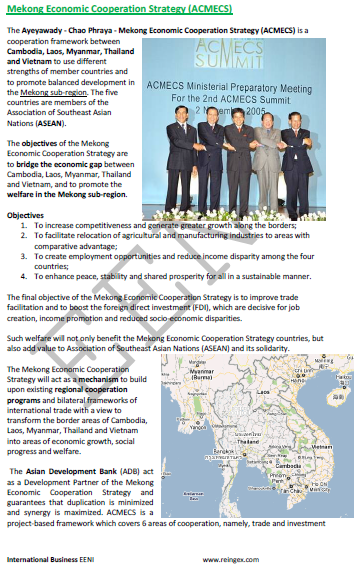ASEAN Trade Agreements, China, Japan
External Relations (ASEAN) Plus Three Cooperation, India, South Korea

ASEAN Plus 3 (APT) consists of ASEAN, China, Japan, and Korea.
- Introduction to the External Relations of the Association of Southeast Asian Nations
- ASEAN Plus Three Cooperation
- Chiang Mai Initiative Multilateralization
- Asian Bond Market Initiative
- China-ASEAN Agreement
- ASEAN-Canada Agreement
- Agreement for Trans-Pacific Partnership
- Regional Comprehensive Economic Association
- ASEAN-Australia-New Zealand Agreement
- ASEAN-India Trade in Goods Agreement
- ASEAN-EU Trade Initiatives
- ASEAN-Japan Agreement
- ASEAN-South Korea Free Trade Area
- ASEAN-Russia
- ASEAN-U.S. Agreement
- ASEAN-Pakistan Free Trade Area
- ASEAN-Hong Kong China Agreement
- Greater Mekong Subregion
Sample - ASEAN Trade Agreements:

The Subject “ASEAN Trade Agreements” is included within the curriculum of the following academic programs at EENI Global Business School:

Masters: International Business, Foreign Trade.


ASEAN plus Three Cooperation framework has broadened and deepened. In international finance and monetary cooperation, the progress has been steady and flowed to focus on “Chiang Mai Initiative Multilateralization” and Asian Bond Market Initiative implementation.
- Chiang Mai Initiative Multilateralization, a 120 billion dollars currency swap facility involving the central banks and finance ministries of ASEAN, China, Japan, and South Korea (ASEAN+3) and the Monetary Authority of Hong Kong, China, has come into effect
- The Asian Bond Market Initiative is an ASEAN+3 initiative supported by the Asian Development Bank and funded by the Government of Japan. The Asian Bond Market Initiative is intended to promote the bond market development in the region: Brunei, Cambodia, China, Indonesia, Japan, South Korea, Laos, Myanmar, the Philippines, Singapore, Thailand, Malaysia, and Vietnam

Other Trade Agreements in ASEAN Region:
- Singapore-Australia Agreement
- Singapore-New Zealand Agreement
- Singapore-South Korea Agreement
- Singapore-European Free Trade Association (EFTA)
- Singapore-Japan Agreement
- Singapore-Jordan
- Singapore-Panama Agreement
Sample:

(c) EENI Global Business School (1995-2025)
Top of this page









 WhatsApp
WhatsApp or
or 

